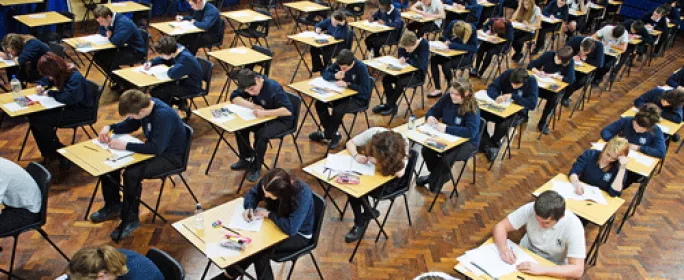GCSE results: Schools ‘shocked’ by fall in English grades as overall passes rise
The crackdown on early and multiple entries has led to the first rise in “good” GCSE grades since 2011, today’s results reveal, but serious concerns have already been raised about a significant drop in the pass rate for English.
The proportion of exam entries achieving A*-C grades rose overall from 68.1 per cent last year to 68.8 per cent this year, although the A* pass rate fell slightly.
But despite exam boards insisting that national results remained “relatively stable”, figures show that the A*-C pass rate in English dropped considerably from 63.6 per cent to 61.7 per cent in the past year.
Individual schools have reported even bigger swings in the proportion of pupils securing good passes in English.
Woodside High School in North London reported a drop of 18 percentage points in the proportion of students achieving A*-C grades in English. Head Dame Joan McVittie said this had resulted in the proportion of students hitting the performance measure of five A*-C grades including English and maths had dropped from 62 per cent to 45 per cent.
Results in English are likely to have been affected by a change in assessment, which has resulted in speaking and listening being graded separately and not being counted in students’ overall grade for the subject.
“They move the grade boundary quite significantly, and take out a lot of my kids. We’re absolutely furious,” Dame Joan added.
A teacher posting on the TES forums said they were “gutted” by the drop in English results. “Barely any A* or A grades at all - for kids who’ve been solid A students for 2 years,” they wrote. “The discrepancy between the reading and writing sections is huge - brilliant writers getting less than half marks? I am so, so angry.”
Andrew Hall, chief executive of the AQA exam board, said there had been particular turbulence in English around the C/D borderline.
Brian Lightman, general secretary of the Association of School and College Leaders, said : “We’re seeing some surprising results which have shocked some schools … There are individuals who have been victims of these changes.”
But OCR chief executive Mark Dawe welcomed the impact of the clampdown on early entries. There had been a “shift of focus towards education rather than exams”. He also said that “the right 15 year-olds” were now being entered for GCSEs early.
Exam boards had already warned that a raft of reforms which came into effect this year would cause increased “volatility” in results for individual schools.
Moves to scrap resists and only count a student’s first sitting of an exam in school performance tables led to the overall number of GCSEs sat this summer falling by more than 220,000.
Last year, the Department for Education had claimed that schools were increasingly “gaming the system” by encouraging early and multiple entries, resulting in students having to sit more exams that necessary, which was “not good for pupils and should happen”.
While some subjects, such as ICT, computing and business studies recorded significant growth, the number of English entries dropped by more than 215,000. Among 15-year-olds, the number of maths entries dropped by a massive 76 per cent, from 170,357 down to 39,292. Overall, the number of entries by students in Year 10 and below dropped by 40 per cent.
“As we would expect, where the change in entry patterns is greatest, such as the sciences, English and maths, we have seen some impact on results,” said JCQ director general Michael Turner. “But despite these changes and the potential for increased centre volatility, candidates can be confident that standards have been maintained.”
Entries were also down in science subjects for the first time in more than a decade. Entries for GCSE science were down by 16.9 per cent. Overall results in the subject, however, improved with the A*-C pass rate rising from 53.1 per cent to 59.1 per cent.
In maths, the proportion of A*-C passes increased from 57.6 per cent to 62.4 per cent.
While entries by younger students dropped, the results of those who did sit GCSEs early were significantly higher. The A*-C pass rate among 15-year-olds across all subjects rocketed from 58.1 per cent last year to 68.2 per cent.
The proportion of A*s among the younger age group went up by more than half, from 4.3 per cent to 6.2 per cent, with the proportion of A*s and As rising from 14.2 per cent to 19.2 per cent. Accordingly the gap between the results of 15- and 16-years-olds narrowed considerably, from 12.8 per cent last year to 1.9 per cent this time around.
The exam boards have argued that the swing was caused by schools only entering their strongest candidates a year early, with weaker performers being given an extra 12 months in the classroom before sitting their exams.
Russell Hobby, general secretary of the NAHT heads’ union, said the rise in A*-C grades “reflects the hard work of students and teachers in a difficult climate”. “It also provides a measure of justification for the recent reforms, perhaps by enabling schools to focus on a fuller course of study before the final tests and from the fall in some inappropriate early entries,” he added.
Related stories:
Early GCSE entries fall dramatically - May 2014
Keep reading for just £1 per month
You've reached your limit of free articles this month. Subscribe for £1 per month for three months and get:
- Unlimited access to all Tes magazine content
- Exclusive subscriber-only stories
- Award-winning email newsletters




